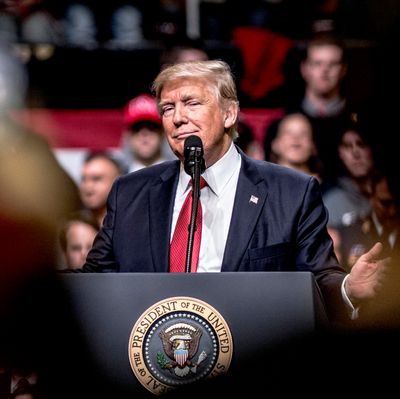
A federal judge in Hawaii put a nationwide freeze on President Trump’s revised travel ban on Wednesday, hours before it would have gone into effect. In his decision granting the temporary restraining order, Federal District Judge Derrick Watson rejected the government’s argument that the travel restrictions did not amount to a Muslim ban, and that only probing Trump’s “veiled psyche” and “secret motives” would turn up evidence of religious discrimination.
Watson agreed that it’s wrong to undertake a “judicial psychoanalysis of a drafter’s heart of hearts,” but he said he didn’t have to. “There is nothing ‘veiled’ about this press release: ‘Donald J. Trump is calling for a total and complete shutdown of Muslims entering the United States,’” the judge wrote. He continued:
Nor is there anything “secret” about the Executive’s motive specific to the issuance of the Executive Order: Rudolph Giuliani explained on television how the Executive Order came to be. He said: “When [Mr. Trump] first announced it, he said, ‘Muslim ban.’ He called me up. He said, ‘Put a commission together. Show me the right way to do it legally.’”
On February 21, 2017, commenting on the then-upcoming revision to the Executive Order, the President’s Senior Adviser, Stephen Miller, stated, “Fundamentally, [despite “technical” revisions meant to address the Ninth Circuit’s concerns in Washington,] you’re still going to have the same basic policy outcome [as the first].”
These plainly worded statements, made in the months leading up to and contemporaneous with the signing of the Executive Order, and, in many cases, made by the Executive himself, betray the Executive Order’s stated secular purpose. Any reasonable, objective observer would conclude, as does the Court for purposes of the instant Motion for TRO, that the stated secular purpose of the Executive Order is, at the very least, “secondary to a religious objective” of temporarily suspending the entry of Muslims.
Basically, the Trump administration can’t publicly declare again and again that they intend to find a way to legally discriminate against Muslims, then turn around and claim that the ban does no such thing.
So, how did the president respond to this latest setback? By complaining that the current order is just a “watered-down version” of the original, more discriminatory order, and bringing up “radical Islamic terrorists.”
Trump discussed the subject for about ten minutes during a rally in Nashville on Wednesday night. “The ruling makes us look weak,” Trump said, as the crowd booed. He called the Ninth Circuit’s decision “unprecedented judicial overreach,” and vowed to take the case all the way to the Supreme Court if necessary. “You don’t think this was done by a judge for political reasons?” he said, sarcastically. “No?”
The president also said he wanted to go back to the original order, and elaborated on who it was meant to target. “The best way to keep foreign terrorists or, as some people would say, in certain instances, radical Islamic terrorists, from attacking our country is to stop them from entering our country in the first place,” he said.
Those fighting the ban thanked the president. “He should just continue talking, because he’s making our arguments for us,” said Marielena Hincapié, executive director of the National Immigration Law Center.






























